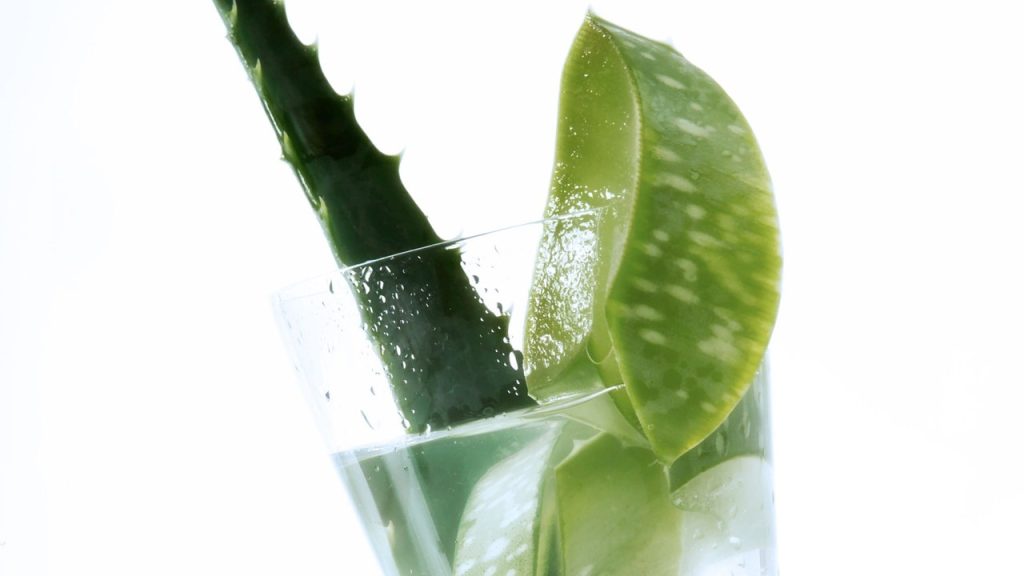If a plant could be called “iconic,” aloe vera would warrant the description. With its spiky, tentacle-like leaves and gooey insides, everyone wants an aloe vera plant on their window. But she’s not merely ornamental. Aloe vera—which grows in tropical, semi-tropical, and arid climates, as well as in your living room—has been used for centuries for its beautifying and medicinal benefits (there’s a reason it’s in all your most calming skincare products). From its anti-inflammatory effects to antimicrobial properties, the aloe vera plant really is that girl.
What a lot of people forget, though, is that you can reap plenty of benefits by going straight to the source—by drinking pure aloe vera juice, which you can buy from most health food shops (don’t go crunching on the aloe vera plant in your bedroom, the latex surrounding the gel inside the leaves can irritate the stomach). When I first started incorporating aloe into my morning breakfast routine, I just stirred it into coconut water. Unlike other health hacks, like acupuncture or 5 a.m. runs, this is an easy one to introduce.
But—and now for the important bit—why? Here’s everything you need to know about aloe vera juice and its many benefits.
What does aloe vera juice taste like?
Depending on the type of juice you go for (there are sugary options that don’t contain the same health benefits or the 100% pure and organic kind), aloe vera can taste a little bitter and mildly citrusy. Again, I like stirring a 50ml shot of the pure stuff into a glass of coconut water in the morning with ice or throwing it into a smoothie where it’s barely noticeable. But a lot of people find it easier to just knock back a few neat tablespoons.
What are the health benefits of aloe vera juice?
As it turns out, this little succulent is a bit of a powerhouse. “Aloe vera juice has a variety of health benefits due to its anti-inflammatory, antimicrobial, and antioxidant properties, and it’s been used for centuries in traditional medicine,” nutritionist April May Morgan, head of nutrition at Artah, tells me. “It’s a rich source of flavonoids, phytosterols, vitamins, and minerals, and it’s been used for everything from oral health and blood sugar control to digestive support and skin quality.” For the specifics, here’s a quick breakdown:
Healthier skin
We know that aloe vera gel can be used topically to treat a variety of ailments (you’ve probably used it at least once to soothe sunburn). Some studies have shown that consuming it can be great for the skin, also. “Drinking aloe vera juice can help improve skin elasticity and reduce signs of aging,” says Morgan. “It can also help with acne or other skin conditions, as it has anti-inflammatory and antimicrobial properties.”
Immune health
According to Morgan, aloe vera juice is rich in antioxidants and vitamins, all of which can help aid and regulate a person’s immune system. “Aloe vera contains vitamins C and E and beta-carotene, all of which are antioxidants that can help fight oxidative stress and strengthen the immune system,” says Morgan. “It also has anti-inflammatory properties that can help modulate the immune response.”
Digestion
Studies have shown that aloe vera juice has the propensity to aid digestion and reduce symptoms of irritable bowel syndrome. “Aloe vera juice is known to have a soothing effect on the digestive tract due to its mucilaginous properties and polysaccharide content,” says Morgan, adding that it can also “help reduce symptoms of acid reflux, heartburn, and indigestion”.
Oral Health
It’s unusual for a drink that isn’t water to actually help with oral hygiene rather than hinder it, but such is the magic of this humble household plant. Some preliminary studies have even shown that aloe can be used as mouthwash. “Aloe vera has antimicrobial properties that may help with oral health by reducing plaque, fighting bacteria, and promoting healthy gums,” says Morgan, adding that the juice “can help soothe and heal mouth ulcers and sores”.
Blood sugar regulation
Although more studies are needed, preliminary research suggests that consuming aloe vera may have a positive impact on glycemic control (essentially, controlling blood sugar levels). This could be beneficial for those with prediabetes and diabetes, although obviously, it’s best to consult your doctor before taking any supplements or drinking any juice if you have those conditions.
How much aloe vera juice should you drink per day?
In general, says April, the recommended dose is between 50 and 120 ml of aloe vera juice per day —so you don’t need to be glugging the stuff like water. If you’re using it to aid with digestive health, it can be helpful to drink before a meal. Otherwise, you’re good to have your daily aloe whenever.







